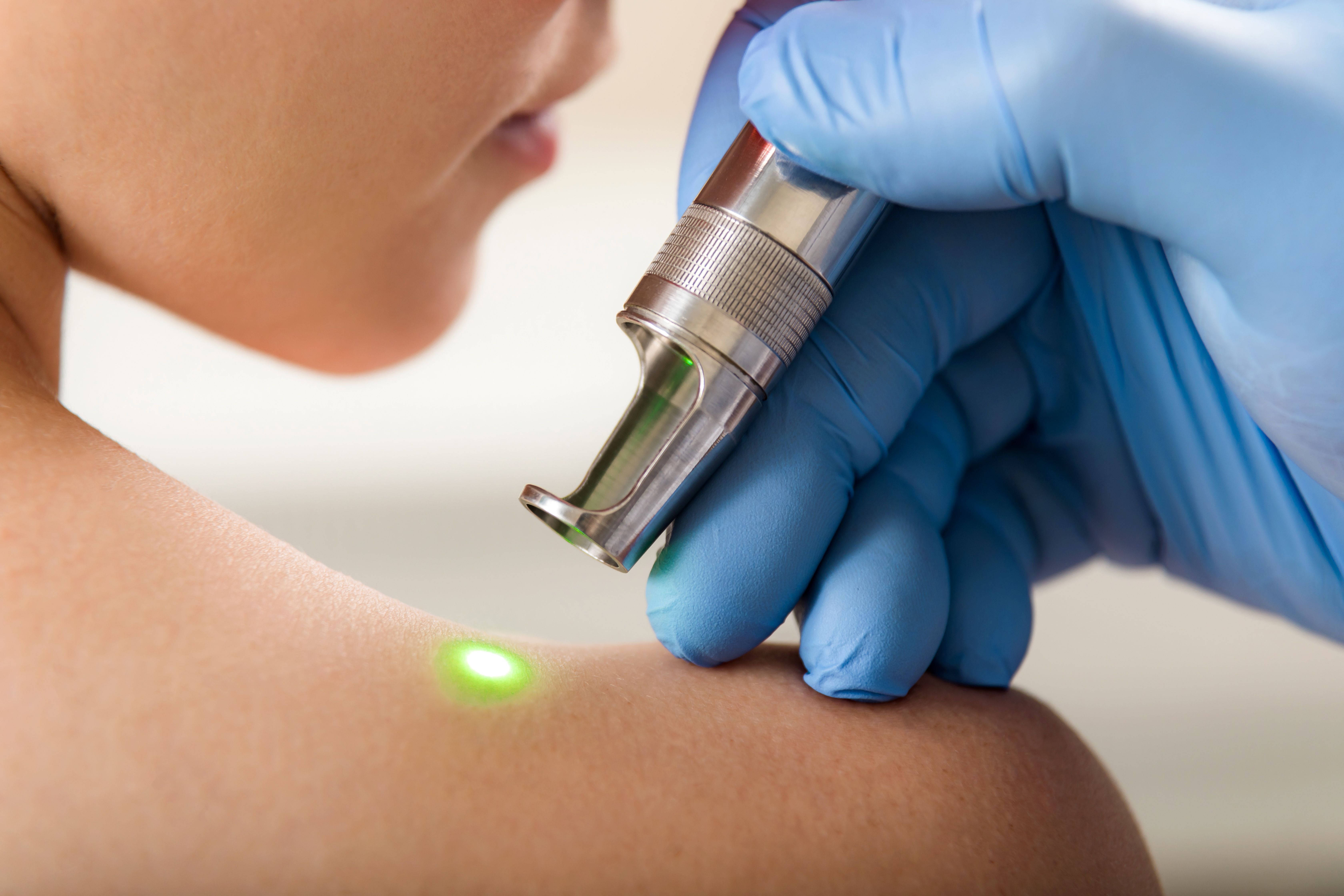- Acne
- Actinic Keratosis
- Aesthetics
- Alopecia
- Atopic Dermatitis
- Buy-and-Bill
- COVID-19
- Case-Based Roundtable
- Chronic Hand Eczema
- Drug Watch
- Eczema
- General Dermatology
- Hidradenitis Suppurativa
- Melasma
- NP and PA
- Pediatric Dermatology
- Pigmentary Disorders
- Practice Management
- Precision Medicine and Biologics
- Prurigo Nodularis
- Psoriasis
- Psoriatic Arthritis
- Rare Disease
- Rosacea
- Skin Cancer
- Vitiligo
- Wound Care
Article
A Revolutionary Way to Revive Sensitive Skin
Author(s):
With the release of three brand-new products, ALASTIN Skincare® is introducing a new line of sensitive skin products that include our proprietary TriHex Technology® along with other active ingredients.
Stinging, burning, redness, and roughness—sensitive skin is easy to spot, but treating patients with highly reactive skin can pose a difficult challenge. Despite the pervasiveness of this condition—studies show that roughly 60–70% of women and 50–60% of men report having some degree of sensitive skin—many commonly used skincare products can aggravate this type of skin rather than soothing it.1
Mara Weinstein Velez, MD, FAAD

Dr. Mara Weinstein Velez, MD, FAAD, Director of Cosmetics and Laser Surgery at the University of Rochester Medical Center in Upstate New York, says, “Many people just keep trying different products without realizing that their skin is not going to tolerate them. As they continue to switch, they get into a downward spiral where they think nothing will work.”
This issue motivated ALASTIN Skincare to create an additional offering within their Daily Restorative Skincare portfolio specifically formulated for sensitive skin, as well as skin compromised from in-office procedures, including lasers, microneedling, and chemical peels. Dr. Alan Widgerow, MBBCh, MMed, FCS, FACS who serves as ALASTIN’s Chief Medical Officer explains the goal of the line is to “help normalize skin pH, improving moisture and skin barrier function while decreasing skin irritation and providing protection from harmful sun rays.”
Alan Widgerow, MBBCh, MMed, FCS, FACS

The new Sensitive Skin formulations include Ultra Calm Cleansing Cream, Ultra Light Moisturizer with TriHex Technology®, and SilkSHIELD All Mineral Sunscreen SPF 30 with TriHex Technology®. Dr. Widgerow says, “According to recent guidelines, the range for sensitive skincare should include a gentle cleanser, moisture-inducing humectants, barrier lipids, and sun protection. That is exactly what this range presents.”
Understanding Sensitive and Compromised Skin
Sensitive skin refers to any skin that is more prone to irritation and inflammation. “Sensitive skin can occur with all different skin types. We see it in patients with both oily and dry skin,” says Dr. Weinstein Velez. The signs of sensitive skin include redness, irritation, itching, burning, flushing, stinging, and a high degree of reactivity to products.2 This could include a wide variety of varying skin conditions, changes in weather patterns, or even post cosmetic procedures which are intended to compromise skin in a controlled way.
The underlying causes of sensitive skin may vary from patient to patient. Commonly, dermatologists see patients with varying conditions which include rosacea, eczema, allergies, and changes in weather, as well as cosmetic procedures which are intended to compromise the skin in a controlled way. Regardless of the root cause, this condition is often characterized by an impaired skin barrier which leads to hyperreactivity.3
Dr. Weinstein Velez explains an impaired skin barrier will allow ingredients in skincare products to penetrate more deeply, causing an adverse reaction. “You can think of it as a cut on the skin. If you put alcohol on skin, it shouldn’t burn or sting, but if you have a cut, you’ll know exactly where that skin barrier is compromised,” she says. Ingredients that are well tolerated by normal healthy skin may irritate more porous and more vascular sensitive skin.4
Treating Sensitive Skin
“Sensitive skin is treatable,” says Dr. Weinstein Velez. When a patient comes into her office with signs of sensitive skin, she first asks which products they use, often asking patients to bring them to the office to inspect the ingredients. Dr. Weinstein Velez says that a common mistake for sensitive skin patients is assuming that plant-based products will be less irritating. “Lavender and tea tree oil can be reactive even though they seem natural,” she says.
She also advises against skincare containing propolis or beeswax (a common allergen),5 as well as alcohol-based products that can strip the skin, and added fragrance, which may lead to irritation.6 Dr. Weinstein Velez adds, “Any exfoliators with beads are horrible for sensitive skin. They can cause microabrasions, and if you have a focus of acne, it can propagate the spreading of bacteria.”7
Instead, products should hydrate, soothe, and help to replenish the skin barrier. Dr. Weinstein Velez recommends patients with sensitive skin focus on three steps: a cleanser, a moisturizer, and a sunscreen. For post-procedure patients, she includes a serum, such as ALASTIN’s Regenerating Skin Nectar with TriHex Technology®, to help reduce downtime. “I recommend cleansing at least once a day and twice if tolerated,” she says, adding that a moisturizer will support the repair of a patient’s compromised skin barrier, while sunblock helps prevent damage from UV rays which can further break down the skin barrier, while leading to fine lines, wrinkles, and pigmentation.8
Introducing the Sensitive Skin Line from ALASTIN
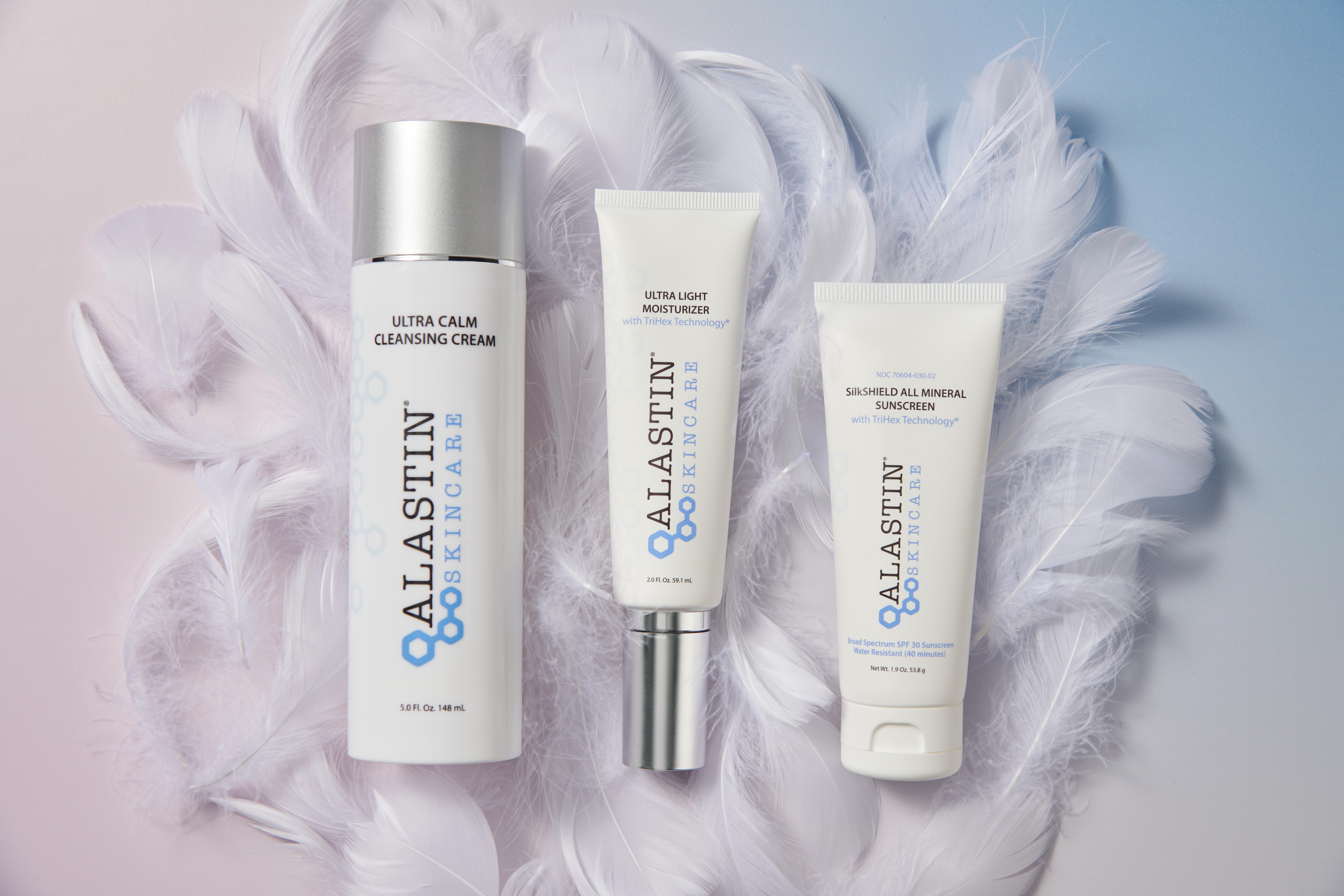
ALASTIN’s new sensitive skin line is specifically formulated to address the issues of sensitive skin, while complementing in-office cosmetic treatments by helping to enhance results and accelerate recovery. John Garruto, Vice President, R&D and Formulations for ALASTIN says, “We felt that we needed to address the needs of patients with especially sensitive skin, for post-procedure and general use. All products have been thoroughly tested for irritation, sensitivity, and allergy response, and all are certified to be non-comedogenic.”
More than two years in the making, this line has most recently been tested in clinical settings under the supervision of top dermatologists, including Dr. Weinstein Velez. Patients have reported significant benefits with 9 out of 10 saying they experienced lasting hydration from the Ultra Light Moisturizer and 96 percent noting that the Ultra Calm Cleansing Cream felt gentle on their sensitive skin in an early experience patient survey. Here’s a look at each product and its benefit for those with sensitive skin, periprocedural skin, and beyond.
The Mild-but-Effective Cleanser
Ideal for sensitive and post-procedure skin, the Ultra Calm Cleansing Cream rids the face of dirt, oil, and makeup, while helping to soothe the skin. “Some of my patients with sensitive skin issues have trouble even tolerating water. Everything they put on their skin burns,” says Dr. Weinstein Velez. She loves this cleanser, because instead of causing irritation, it helps to calm the skin with oat protein extract, while supporting the skin’s barrier function with triglycerides and linoleic acid.9,10
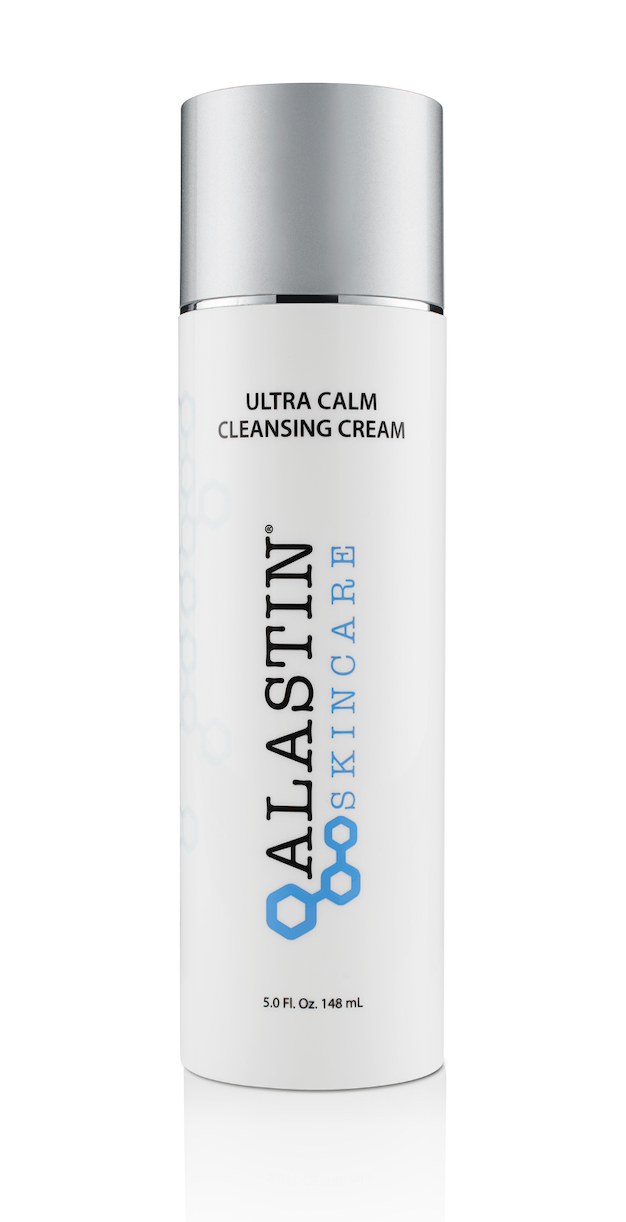
“A cleanser for sensitive skin should be non-stripping, it should promote hydration by replenishing lipids and ceramides lost due to irritation, while removing dirt and oil without causing a reaction—that’s exactly what the Ultra Calm Cleansing Cream does,” she says. Dr. Weinstein Velez adds that while her patients have reported that other cream cleansers are less effective at ridding the skin of makeup, they found success with this formulation. “It’s extremely gentle, but it’s still a workhorse,” she says.
The doctor adds that this cleanser is a game-changer following an in-office treatment. “We do a lot of lasers and other procedures in the office, and I would recommend this to any post-procedure patient.”
Weightless Hydration
The Ultra Light Moisturizer with TriHex Technology® helps to maintain proper hydration and support the skin’s natural barrier, while nourishing and hydrating skin in a lightweight formula that easily glides on the skin. “For sensitive skin patients, less is more,” says Dr. Weinstein Velez. “This is the perfect product to use for that light hydration you need without being too heavy or occlusive, and it’s light enough that it can be used twice a day.”
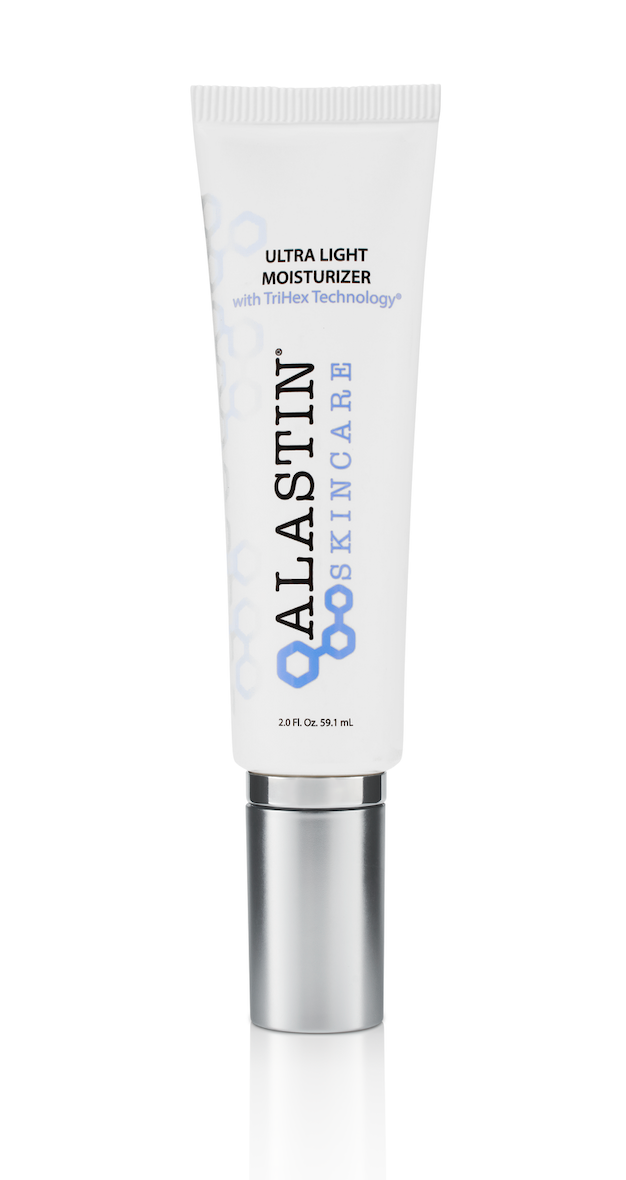
The moisturizer helps to hydrate with silver mushroom, which has hydrating properties even more powerful than hyaluronic acid,11 as well as D-Panthenol, a vitamin B5 derivative that helps to soften and moisturize the skin.12 Dr. Weinstein Velez says she also appreciates the addition of ginger root extract. “This is a known calming ingredient, so it’s going to help address the appearance of redness, while soothing the skin.”
The addition of ALASTIN’s proprietary TriHex Technology® combats the signs of aging by working with the skin to help clear out damaged elastin and collagen while supporting the skin's natural ability to produce new, healthy elastin and collagen.13 “That benefit is unmatched and something you can’t find in any other product line,” says Dr. Weinstein Velez.
The Anti-Aging Sunscreen
Sun protection is important for all patients, but especially those with sensitive skin or compromised skin due to an in-office procedure, as exposure to UVA/UVB rays can cause further damage to an already compromised skin barrier and possibly lead to a slower recovery from the procedure and hyperpigmentation.14 Dr. Weinstein Velez says getting patients to stick with a sun care regimen, however, can be tricky: “It seems like all day long, I hear from patients that don’t use sunscreen because they can’t find anything that they don’t react to.”
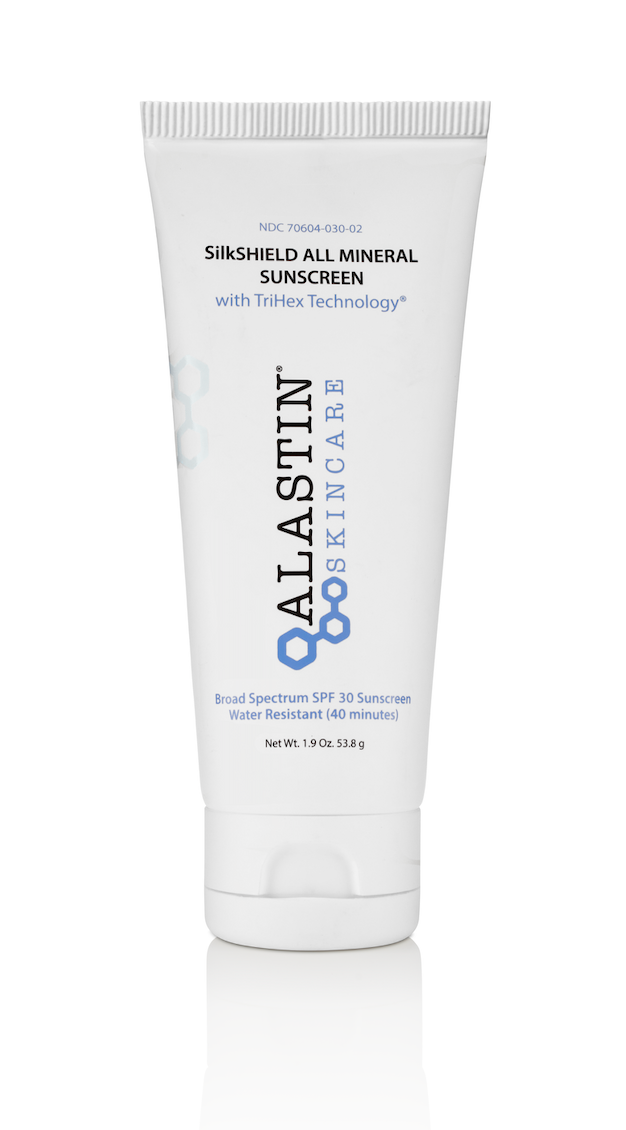
That’s where SilkSHIELD SPF 30 with TriHex Technology® comes in. The block is a 100-percent mineral-based, physical sunscreen. “We typically recommend mineral based sunscreens for sensitive skin, because they are less likely to react,” says Dr. Weinstein Velez, who adds, “I’ve never felt any sunscreen of its kind. SilkSHIELD is so silky and smooth but at the same time really lightweight and moisturizing.”
The benefits go beyond simple sun protection with ingredients to help block IR rays, pollution, and blue light. Triglycerides and hyaluronic acid-boosters help to support the skin’s barrier function while helping to hydrate skin.15,16 SilkSHIELD is also the first sunscreen from ALASTIN to contain its proprietary TriHex Technology,® which helps clear out old, damaged elastin and collagen, while encouraging the replenishment of new healthy proteins. “The more TriHex the better,” says Dr. Weinstein Velez. “One-hundred percent of my patients who have tried SilkSHIELD loved it and say that they are switching.”
Designed to Work Together
While the new sensitive skin line is formulated to address the needs of those with sensitive skin and post-procedure patients, the products are appropriate for anyone who prefers a creamy cleanser, or who appreciates the added anti-aging benefits TriHex Technology® provides to a lightweight moisturizer or sophisticated sunscreen. “Everything is so layer-able and seamlessly integrated,” says Dr. Weinstein Velez.
References:
- Farage MA. The prevalence of sensitive skin. Front Med (Lausanne). 2019 May 17. 2019;6:98.
- Farage MA. The prevalence of sensitive skin. Front Med (Lausanne). 2019 May 17. 2019;6:98.
- Duarte I, Silveira JEPS, Hafner MFS, et al. Sensitive skin: review of an ascending concept. An Bras Dermatol. 2017;92(4):521-525.
- Rosso JD, Zeichner J, Alexis A, et al. Understanding the epidermal barrier in healthy and compromised skin: clinically relevant information for the dermatology practitioner: proceedings of an expert panel roundtable meeting. J Clin Aesthet Dermatol. 2016;9(4 Suppl 1):S2-S8.
- Basavaiah ND, Suryakanth DB. Propolis and allergic reactions. J Pharm Bioallied Sci. 2012;4(4):345.
- Johansen JD, Rastogi SC, Andersen KE, et al. Content and reactivity to product perfumes in fragrance mix positive and negative eczema patients. A study of perfumes used in toiletries and skin-care products. Contact Dermatitis. 1997 Jun;36(6):291-6.
- Rodan K, Fields K, Majewski G, Falla T. Skincare Bootcamp: The Evolving Role of Skincare. Plast Reconstr Surg Glob Open. 2016 Dec 14. 2016;4(12 Suppl Anatomy and Safety in Cosmetic Medicine: Cosmetic Bootcamp):e1152
- Biniek K, Levi K, Dauskardt RH. Solar UV radiation reduces the barrier function of human skin. Proc Natl Acad Sci U S A. 2012;109(42):17111-17116.
- Vyumvuhore, R. et al. Vibrational spectroscopy coupled to classical least square analysis, a new approach for determination of skin moisturizing agents' mechanisms. Skin Research and Technology 20.3, 282-292 (2014)
- Berbis P, Hesse S, Privat Y. Essential fatty acids and the skin. Allerg Immunol (Paris). 1990 Jun;22(6):225-31.
- Shen T, Duan C, Chen B, et al. Tremella fuciformis polysaccharide suppresses hydrogen peroxide-triggered injury of human skin fibroblasts via upregulation of SIRT1. Mol Med Rep. 2017;16(2):1340-1346.
- Camargo FB Jr, Gaspar LR, Maia Campos PM. Skin moisturizing effects of panthenol-based formulations. J Cosmet Sci. 2011 Jul-Aug;62(4):361-70.
- Widgerow AD, Fabi SG, Palestine RF, et al. Extracellular matrix modulation: optimizing skin care and rejuvenation procedures. J Drugs Dermatol. 2016;15(4)(suppl):s63-s71.
- Liu H, Yue J, Lei Q, Gou X, Chen SY, He YY, Wu X. Ultraviolet B Inhibits Skin Wound Healing by Affecting Focal Adhesion Dynamics. Photochem Photobiol. 2015 Jul-Aug;91(4):909-16. doi: 10.1111/php.12462. Epub 2015 May 16.
- Vyumvuhore, R. et al. Vibrational spectroscopy coupled to classical least square analysis, a new approach for determination of skin moisturizing agents' mechanisms. Skin Research and Technology 20.3, 282-292 (2014)
- Product monograph: Symdecanox, Symrise June 2015.
Newsletter
Like what you’re reading? Subscribe to Dermatology Times for weekly updates on therapies, innovations, and real-world practice tips.











